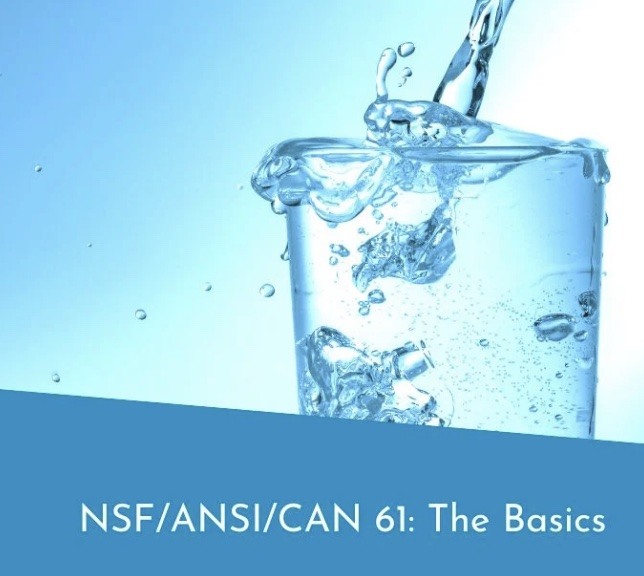
How Our Coatings Ensure Compliance for Potable Water Tanks
Ensuring compliance for potable water tanks is crucial for public health and safety. Discover how our specialized coatings meet stringent standards while enhancing tank durability.
- Rick Gilbreath
HOW OUR COATINGS ENSURE COMPLIANCE FOR POTABLE WATER TANKS:
Ensuring compliance for potable water tanks is crucial for public health and safety. Discover how our specialized coatings meet stringent standards while enhancing tank durability.
Understanding Potable Water Tank Standards and Regulations
Potable water tanks are subject to a comprehensive set of strict standards and regulations meticulously crafted to ensure the utmost safety and quality of drinking water. These regulations are not only numerous but are also rigorously enforced by a variety of governmental and non-governmental organizations, including prominent entities such as the Environmental Protection Agency (EPA) and the National Sanitation Foundation (NSF). The role of these organizations is pivotal, as they establish and uphold the guidelines that dictate how potable water tanks should be constructed, maintained, and operated. Compliance with these standards is absolutely crucial, as it serves as a safeguard against contamination, ensuring that the water stored within these tanks remains safe and suitable for human consumption at all times.
The key regulations encompass a wide range of aspects, including the materials used in the construction of tanks, the specific installation procedures that must be followed, and the ongoing maintenance requirements that need to be adhered to. These standards are meticulously designed to prevent the presence of harmful chemicals, bacteria, and other contaminants that could potentially compromise water quality. For instance, the materials used in tank construction must be non-toxic and resistant to corrosion, while installation procedures must ensure that tanks are securely sealed and protected from external pollutants. Furthermore, regular maintenance is mandated to ensure that any potential issues are promptly addressed, thereby preventing any compromise in water quality.
By diligently adhering to these comprehensive regulations, we can ensure that potable water tanks consistently provide safe, clean water to communities. This adherence not only protects public health but also instills confidence in the reliability of water storage systems. It is through this rigorous compliance with established standards that we can guarantee the delivery of high-quality drinking water, thereby safeguarding the well-being of individuals and communities who rely on these essential water storage solutions.
The Importance of NSF Certification in Potable Water Tanks
NSF Certification is an indispensable and critical component of ensuring that potable water tanks adhere to the highest standards of compliance. The NSF International, a globally recognized and independent organization, plays a pivotal role in safeguarding public health by developing comprehensive public health standards and certification programs. These programs are meticulously designed to protect the world's food, water, consumer products, and environment from potential hazards. For potable water tanks, the NSF/ANSI Standard 61 is the paramount certification to seek, as it specifically addresses the safety and quality of drinking water system components. This standard is crucial because it sets forth rigorous criteria that products must meet to ensure they do not leach harmful contaminants into the water supply.

Products that achieve NSF Certification undergo an exhaustive and rigorous testing process. This process is designed to meticulously evaluate and confirm that the products do not introduce any harmful substances into the water, thereby ensuring the water remains safe for human consumption. This certification serves as a vital assurance to regulators, manufacturers, and consumers alike, providing them with confidence that the products used in water tanks meet the most stringent public health standards. It acts as a seal of quality and safety, indicating that the materials and coatings have been thoroughly vetted and approved for use in potable water systems.
When selecting materials and coatings for potable water tanks, NSF Certification is not merely a recommendation but a non-negotiable requirement. It is essential for ensuring the safety and compliance of water storage solutions. This certification guarantees that the products have been tested and verified to meet the highest standards, thereby protecting public health and ensuring that the water remains free from contaminants. By prioritizing NSF Certification, manufacturers and operators can ensure that their potable water tanks are equipped with the safest and most reliable materials, ultimately safeguarding the health and well-being of the communities they serve.
How Our Coatings Meet and Exceed Industry Requirements
Our specialized coatings are engineered to not only meet but also surpass the stringent industry requirements set for potable water tanks. These coatings are crafted with precision to create a robust and enduring protective barrier that effectively resists corrosion and prevents any form of contamination from compromising the water quality. By incorporating cutting-edge materials, like Tnemec Series 94-H20 or Series 21, that adhere to the rigorous standards of NSF/ANSI Standard 61, we ensure that our coatings maintain the highest level of safety and do not introduce any harmful substances into the water supply.

Furthermore, our coatings are designed to offer exceptional durability and longevity, which significantly reduces the necessity for frequent maintenance and repairs. This aspect is crucial as it not only guarantees compliance with regulatory standards but also translates into substantial long-term cost savings for our clients. By choosing to invest in our high-quality coatings, operators of potable water tanks can rest assured in the knowledge that their water storage solutions are both safe and reliable. This investment in superior coatings ultimately enhances the overall integrity and performance of the tanks, providing peace of mind to those responsible for maintaining the safety and quality of the water supply.
Innovative Tank Design for Enhanced Compliance and Longevity
Innovative tank design plays a crucial role in ensuring compliance with stringent industry standards and extending the lifespan of potable water tanks, which are essential for providing safe drinking water to communities. These modern designs are thoughtfully developed to incorporate a variety of features that facilitate easy cleaning and maintenance, significantly reduce the risk of contamination, and enhance the overall structural integrity of the tanks. For instance, the use of smooth, non-porous surfaces is a key design element that can effectively prevent the buildup of biofilm, bacteria, and other harmful contaminants that could compromise water quality. This design choice not only simplifies the cleaning process but also ensures that the tanks remain hygienic and safe for storing potable water over extended periods.

Additionally, the integration of advanced engineering techniques and cutting-edge materials plays a pivotal role in improving the durability and resilience of water tanks. By utilizing corrosion-resistant alloys and high-performance coatings, these innovative designs are capable of withstanding harsh environmental conditions, such as extreme temperatures, humidity, and exposure to chemicals. This resilience minimizes the risk of leaks, structural failures, and other issues that could lead to water contamination or loss. These innovations are not only crucial for ensuring compliance with current regulatory standards but also serve to future-proof potable water tanks
against evolving regulatory requirements and technological advancements. By investing in such forward-thinking design and engineering solutions, manufacturers and operators can ensure that their water storage systems remain reliable, efficient, and safe for years to come, ultimately safeguarding public health and instilling confidence in the communities they serve.
Routine Maintenance: Ensuring Long-Term Compliance and Safety
Routine maintenance is absolutely essential for ensuring the long-term compliance and safety of potable water tanks, which are critical components in the infrastructure that provides clean drinking water to communities. This maintenance involves a comprehensive approach that includes regular inspections and thorough cleanings, both of which are vital in identifying and addressing potential issues before they escalate into serious problems that could compromise water quality. During these inspections, it is crucial to meticulously check for any signs of wear and tear, which could indicate structural weaknesses, as well as corrosion, which can lead to leaks and contamination. Additionally, monitoring for microbial growth is imperative, as bacteria and other microorganisms can proliferate in water tanks, posing significant health risks if not promptly managed. Ensuring that the protective coatings on the tanks remain intact and effective is another critical aspect of maintenance, as these coatings serve as a barrier against contaminants and environmental damage.

A proactive maintenance plan should also incorporate periodic testing of water quality, which is essential for detecting any contaminants that may have inadvertently entered the system. This testing should be conducted at regular intervals to ensure that any potential issues are identified and rectified swiftly, thereby maintaining the integrity of the water supply. By adhering to a consistent and well-structured maintenance schedule, potable water tank operators can ensure that their systems remain in full compliance with stringent regulatory standards, which are designed to protect public health. This diligent approach not only guarantees the continued provision of safe, clean drinking water but also instills confidence in the reliability of the water storage systems. Investing in routine maintenance is a proactive measure that ultimately safeguards the health and well-being of the communities that depend on these vital water storage systems, ensuring that they remain a dependable source of potable water for years to come.
If you are ready for help with specification development and maintenance planning, reach out now for an immediate and free consultation. Contact Us Here!

NSF-Approved Coatings for Potable Water Tanks
NSF-APPROVED COATINGS FOR POTABLE WATER TANKS
...

No Need To Fear NSF-600!
Tnemec Company is well-prepared for the changes...

Interior Immersion Grade Coatings: Protecting...
Ensuring the longevity and safety of potable...
